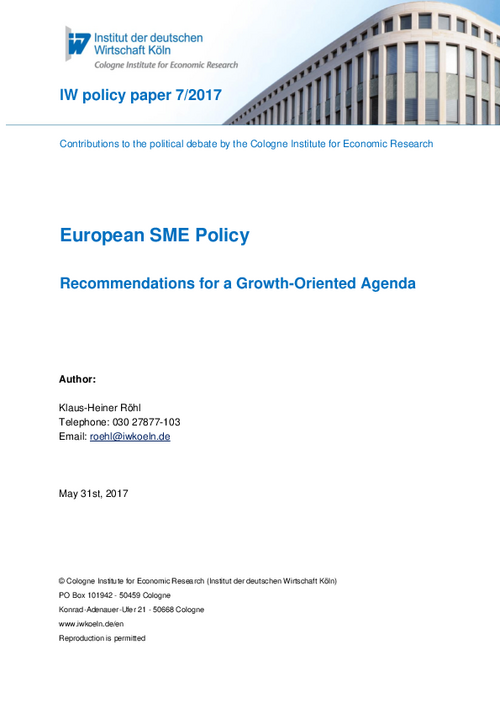As a result of the European debt crisis, start-ups and established small and medium-sized companies have returned into focus for policy-makers in Brussels. They hope that SMEs create more jobs and growth. Despite this, the concerns of SMEs are still not at the heart of economic policy and regulation.

European SME Policy: Recommendations for a Growth-Oriented Agenda
IW policy paper

As a result of the European debt crisis, start-ups and established small and medium-sized companies have returned into focus for policy-makers in Brussels. They hope that SMEs create more jobs and growth. Despite this, the concerns of SMEs are still not at the heart of economic policy and regulation.
The economic policy of the European Union influences the almost 23 million small and medium-sized companies in the 28 Member States in a variety of ways. Yet, there exists no coherent EU policy on small and medium-sized enterprises. With the Small Business Act of 2008, small and medium-sized enterprises received greater attention, but this primarily applies to start-ups and small companies. As a result of the European debt crisis, start-ups and established small and medium-sized companies have returned into focus for policy-makers in Brussels. They hope that SMEs create more jobs and growth. Despite this, the concerns of SMEs are still not at the heart of economic policy and regulation. That is also clear when looking at the EU budget and its high agricultural expenditures. It is particularly problematic that larger family companies with over 250 employees or a turnover of 50 million euro are regarded as large companies. They are treated in the same way as big corporations. A better targeted EU policy on SMEs should reduce red tape for companies and include family companies that have grown beyond the defined SME thresholds. Additionally, it should recognise medium-sized industrial enterprises as key partners in implementing the objective of reinvigorating European industry by 2020.

Klaus-Heiner Röhl: European SME Policy – Recommendations for a Growth-Oriented Agenda
IW policy paper


Berliner Gespräche Frühjahrstagung: Zwischen Sicherheitspolitik, Green Deal und Wettbewerbsfähigkeit – eine europapolitische Bestandsaufnahme
Das Institut der deutschen Wirtschaft möchte Sie erneut zu einer virtuellen Variante der „Berliner Gespräche” einladen.
IW
Die Zukunft Europas: Welche Prioritäten sind für die Wettbewerbsfähigkeit entscheidend?
Die Europäische Union hat ihre neue strategische Agenda für die Jahre 2024 bis 2029 veröffentlicht. IW-Direktor Michael Hüther und HRI-Präsident Bert Rürup analysieren im Handelsblatt-Podcast „Economic Challenges” die Bedeutung der Wettbewerbsfähigkeit für die ...
IW